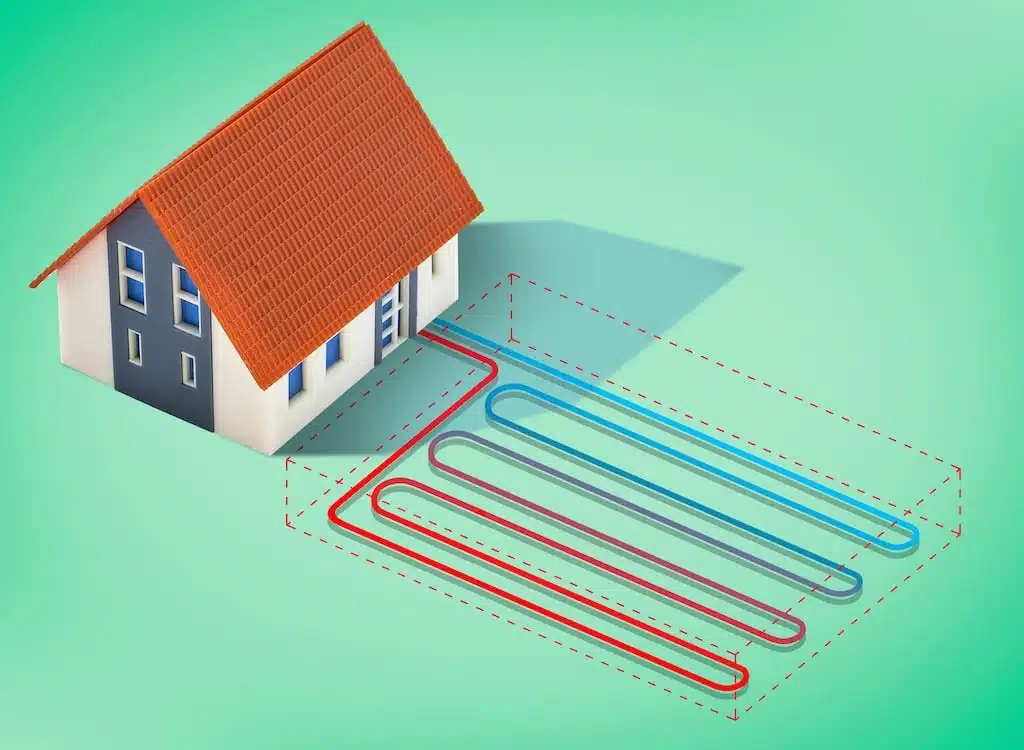Geothermal Heating and Cooling in Fort Worth, Texas
Photo By Soloviova Liudmyla at Shutterstock
Revolutionizing Comfort with Geothermal Heating and Cooling in Fort Worth, Texas
Imagine a world where you could control the temperature of your home, not by battling the elements, but by harnessing the steady, reliable energy beneath your feet.
Welcome to the world of geothermal heating and cooling, a world where the comfort of your home in Fort Worth, Texas, is not at the mercy of the scorching summer heat or the biting winter cold.
As an HVAC company, we understand the challenges that come with maintaining a comfortable temperature in your home, especially during the extreme weather conditions we often experience in Texas.
Traditional heating and cooling systems can be inefficient, expensive to run, and harmful to the environment. That’s where geothermal heating and cooling comes in.
Geothermal Heating and Cooling systems work by leveraging the constant temperatures found just a few feet below the earth’s surface.
Regardless of the weather outside, the temperature underground remains relatively stable. In Fort Worth, Texas, the temperature 10 feet below the surface stays around a comfortable 55 degrees, regardless of whether it’s a sweltering summer day or a frigid winter night.
This is where our AC repair company comes in. We specialize in the installation and maintenance of geothermal heating and cooling systems.
These systems use a heat pump to move heat from the inside air to a heat sink below the surface during the cooling cycle, or to draw heat up from the buried heat sink during the heating cycle.
This process is not only more efficient than traditional heating and cooling methods, but it’s also more environmentally friendly.
But the benefits of geothermal heating and cooling don’t stop there. These systems are also incredibly reliable.
Unlike traditional HVAC systems, which can break down and require emergency heating and AC repair, geothermal Heating and Cooling systems are designed to last.
The below-ground components of a geothermal Heating and Cooling system can last up to 50 years, while the above-ground components can be expected to last for 25 to 30 years.
So, if you’re tired of battling the elements and are looking for a more efficient, reliable, and environmentally friendly way to heat and cool your home, it’s time to consider geothermal heating and cooling.
As a leading HVAC company in Fort Worth, Texas, we have the expertise and experience to help you make the switch.
Call us today at 817-283-6911 to learn more about how geothermal heating and cooling can benefit you.
Understanding Geothermal Heating and Cooling
Geothermal heating and cooling systems are a marvel of modern technology, leveraging the constant temperatures found just a few feet below the earth’s surface to provide efficient, reliable, and environmentally friendly climate control.
We’re excited to bring this innovative solution to homes and businesses in Fort Worth, Texas.
In Fort Worth, Texas, the temperature 10 feet below the surface stays around a comfortable 55 degrees, regardless of whether it’s a sweltering summer day or a frigid winter night.
This is the magic of geothermal energy – it’s always there, waiting to be harnessed. A geothermal heat pump uses this constant subsurface temperature to your advantage, providing heating in the winter by drawing from the warmer ground and cooling in the summer by depositing heat back into the cooler earth.
But how exactly does this work?
The geothermal heat pump is a sophisticated piece of equipment that operates on a simple principle: heat exchange.
During the winter, the pump extracts heat from the ground, amplifies it, and then distributes it throughout your home. In the summer, the process is reversed.
The pump extracts heat from your home and transfers it back into the ground. This process is not only efficient but also incredibly reliable.
We often see traditional HVAC systems struggle to maintain comfortable temperatures during extreme weather conditions. They work overtime, consume a lot of energy, and often require frequent maintenance or repair.
In contrast, geothermal Heating and Cooling systems provide consistent comfort, regardless of the weather outside. They operate quietly, require less maintenance, and can significantly reduce your energy bills.
Moreover, geothermal Heating and Cooling systems are an environmentally friendly choice. They reduce our reliance on fossil fuels and help to lower greenhouse gas emissions. By choosing geothermal heating and cooling, you’re not just improving your own comfort – you’re also contributing to a healthier planet.
We have a team of experienced technicians who can handle everything from the initial installation to ongoing maintenance and repairs. We also offer emergency heating and AC repair services, ensuring that you’re never left in the cold (or heat!).
If you’re ready to experience the benefits of geothermal heating and cooling for yourself, we invite you to get in touch.
Our team can provide a detailed assessment of your home or business and recommend the best geothermal Heating and Cooling solution for your needs.
Call us today at 817-283-6911 to schedule a consultation and discover the difference that geothermal heating and cooling can make.

Photo By Francesco Scatena at Shutterstock
The Components of a Geothermal System
A geothermal Heating and Cooling system consists of three main components:
The Heat Sink
This is the component buried under the ground, in constant contact with the steady subsurface temperature.
Typically, heat sinks are plastic or metal pipes inserted either vertically or horizontally into the ground, filled with a heat transfer fluid such as water or an antifreeze solution. The choice between a vertical or horizontal setup largely depends on the available land area.
Larger facilities often opt for vertical installations as horizontal ones require more land. The heat sink plays a crucial role in the geothermal Heating and Cooling system, acting as the conduit between the stable underground temperatures and the heat pump.
The Heat Pump
This is the device that moves heat from the inside air to the heat sink below the surface during the cooling cycle, or draws heat up from the buried heat sink during the heating cycle.
It’s the heart of the geothermal Heating and Cooling system, responsible for the actual process of heating and cooling your home.
We often find that the heat pump is the component that people are most familiar with, as it’s similar in function to the heat pumps found in traditional HVAC systems.
However, the efficiency and effectiveness of a geothermal heat pump far exceed those of standard heat pumps.
The Distribution System
This is the part of the geothermal heat pump that delivers the heating or cooling to your home. In most geothermal applications, these are ductless systems.
The distribution system is what brings the comfort of geothermal heating and cooling directly into your living or working space. It’s designed to provide even, consistent temperature control, ensuring that every corner of your home is just as comfortable as the next.
Understanding these components is key to appreciating the benefits of a geothermal Heating and Cooling system.
We believe in empowering our customers with knowledge, so they can make informed decisions about their heating and cooling needs.
Geothermal Heating and Cooling systems are a significant investment, but they’re one that pays off in the long run.
They offer superior comfort, lower energy bills, and a reduced environmental impact compared to traditional HVAC systems. Plus, with our expert installation and maintenance services, you can rest assured that your geothermal Heating and Cooling system will provide reliable comfort for years to come.
Ready to explore the benefits of geothermal heating and cooling? Call us today at 817-283-6911.
Our team of experts is ready to answer your questions and help you find the perfect geothermal solution for your home or business.
Is a Geothermal System Right for You?
We often get asked if a geothermal Heating and Cooling system is the right choice.
The answer to this question depends on a variety of factors, but in many cases, the benefits of geothermal heating and cooling make it an excellent choice for homeowners and businesses alike.
Geothermal Heating and Cooling systems typically use 40 to 60 percent less energy than conventional HVAC systems.
This efficiency translates into significant savings on your energy bills. Over time, these savings can more than offset the initial cost of installing a geothermal system. In fact, most geothermal Heating and Cooling system owners recoup their initial investment within the first five to 10 years of operation.
But the benefits of geothermal heating and cooling extend beyond just energy savings.
The below-ground components of a geothermal Heating and Cooling system have a life expectancy of 50 years, and the above-ground components can be expected to last for 25 to 30 years.
This longevity means that once you’ve installed a geothermal Heating and Cooling system, you can expect decades of reliable, efficient heating and cooling.
In addition to their efficiency and longevity, geothermal systems are also incredibly quiet. Unlike traditional HVAC systems, which can be noisy and disruptive, geothermal heat pumps operate with a whisper-quiet hum.
This makes them an excellent choice for homes and businesses where noise can be a concern.
Furthermore, geothermal Heating and Cooling systems require very little maintenance. We find that our customers with geothermal systems require fewer service calls than those with traditional HVAC systems.
This low-maintenance nature not only saves you time and hassle, but it also contributes to the overall cost-effectiveness of geothermal heating and cooling.
So, is a geothermal Heating and Cooling system right for you?
If you value efficiency, longevity, quiet operation, and low maintenance, then the answer is likely yes. But the best way to determine if a geothermal Heating and Cooling system is the right fit for your specific needs is to speak with a professional.
That’s where we come in. We have the expertise and experience to help you make an informed decision.
Call us today at 817-283-6911 to schedule a consultation.
We’ll assess your heating and cooling needs, explain the benefits of geothermal heating and cooling in more detail, and help you determine if a geothermal system is the right choice for you.

Photo By Jacob Lund at Shutterstock
Why Work With Us?
Choosing the right AC repair company for your heating and cooling needs is a crucial decision.
You want a company that not only has the technical expertise but also understands your needs and values your comfort. That’s where we come in.
Here are some reasons why you should consider us for your geothermal heating and cooling needs:
Expertise
At the heart of our company is a team of highly trained and experienced professionals who are well-versed in all aspects of geothermal heating and cooling.
Our team’s expertise is the cornerstone of our ability to deliver top-notch service to our clients in Fort Worth, Texas, and the surrounding areas.
From the moment you reach out to us, you’ll be in the hands of experts. Our initial consultation process is designed to understand your unique needs and preferences.
We take the time to assess your current heating and cooling system, your energy usage, and your comfort goals. This thorough understanding allows us to recommend the most effective and efficient geothermal Heating and Cooling solution for your home or business.
Once we’ve designed the perfect geothermal system for you, our installation team takes over. With meticulous attention to detail, they’ll install your new system to the highest standards, ensuring optimal performance and longevity.
But our expertise doesn’t stop at installation. We also offer comprehensive maintenance services to keep your geothermal Heating and Cooling system running at its best.
And if you ever need repairs, our team is equipped with the knowledge and tools to get your system back up and running quickly.
In short, when you choose us as your HVAC company, you’re choosing a team of experts committed to your comfort and satisfaction.
Personalized Service
As a family-owned and operated HVAC company, we believe in the power of personalized service. We understand that every home and business in Fort Worth, Texas, is unique, each with its own set of heating and cooling needs.
This understanding is what drives us to provide services that are tailored to meet your specific needs and preferences.
From the moment you reach out to us, you become part of our family.
We take the time to listen to your concerns, understand your comfort goals, and learn about your energy usage. This information allows us to provide you with a heating and cooling solution that is not only efficient and effective but also perfectly suited to your lifestyle or business operations.
Our commitment to personalized service extends to our installation, maintenance, and repair services.
We work around your schedule, respect your property, and always strive to minimize disruption to your daily routine or business operations. And if you ever have questions or concerns, our team is always just a phone call away, ready to provide the answers and support you need.
In short, when you choose us, you’re not just getting a service provider – you’re getting a partner committed to your comfort and satisfaction.
Cost-Benefit Analysis 
Investing in a geothermal Heating and Cooling system is indeed a significant decision. It involves an upfront cost that may seem daunting.
However, it’s essential to consider the long-term benefits and savings that these systems offer. We are committed to helping you make an informed decision.
Our team of experts is ready to provide you with a detailed cost-benefit analysis for a geothermal heat pump.
This analysis will give you a clear picture of the potential energy savings you can expect. Geothermal Heating and Cooling systems typically use 40 to 60 percent less energy than conventional HVAC systems, which translates into substantial savings on your energy bills over time.
We’ll also help you understand the expected payback period.
While geothermal systems do have a higher upfront cost, the energy savings they provide often result in a payback period of just five to ten years. After this period, the savings you make are essentially money back in your pocket.
Lastly, we’ll highlight the environmental benefits of choosing a geothermal Heating and Cooling system. These systems reduce reliance on fossil fuels, contribute to lower greenhouse gas emissions, and promote a more sustainable future.
In short, our goal is to provide you with all the information you need to make the best decision for your home or business.
We believe in the benefits of geothermal heating and cooling, and we’re here to help you understand them too.
Longevity
With over 25 years of service in the Fort Worth area, we have stood the test of time. Our longevity in the industry is a testament to our commitment to quality, reliability, and customer satisfaction.
As a family-owned and operated company, we have seen the industry evolve, and we have evolved with it, always staying at the forefront of technology and service standards.
Our long-standing presence in the community has allowed us to build a reputation that we are proud of.
We are known for our high-quality workmanship, our reliable service, and our dedication to customer satisfaction. We have served generations of families and businesses, providing them with comfort and peace of mind through our heating and cooling services.
When you choose us, you’re not just choosing an AC repair company; you’re choosing a partner with a proven track record.
You’re choosing a team that has demonstrated its expertise and commitment over decades. You’re choosing a company that values its customers and strives to provide the best service possible, every single time.
In short, our longevity is your guarantee of quality and reliability. With us, you can be confident that you’re making a choice that will serve you well for years to come.
Comprehensive Services
As a leading HVAC company in Fort Worth, Texas, we pride ourselves on offering a comprehensive range of services to meet all your heating and cooling needs.
Our services are designed to provide you with total comfort, energy efficiency, and peace of mind.
Our services begin with the installation of new geothermal systems. We work closely with you to design a system that fits your specific needs and preferences. Our team of experts handles every aspect of the installation process, ensuring that your new system is set up for optimal performance and longevity.
But our services don’t stop at installation. We also offer regular maintenance services to keep your geothermal system running at its best.
Regular maintenance not only ensures efficient operation but also helps to prevent potential issues before they become costly repairs.
And if your system ever needs repairs, our team is ready to help. We offer repair services for all types of geothermal systems, and we’re equipped to handle everything from minor issues to major repairs.
We understand that heating and cooling emergencies can happen at any time, which is why we also offer emergency heating and AC repair services. Whether it’s a sweltering summer day or a freezing winter night, you can count on us to be there when you need us most.
In short, you’re choosing a partner who can meet all your heating and cooling needs. We’re here to provide you with comprehensive, reliable, and high-quality services, no matter what your needs may be.
Customer Satisfaction
 At the core of our company is a deep commitment to customer satisfaction.
At the core of our company is a deep commitment to customer satisfaction.
We understand that our customers are the heart of our business, and we strive to exceed your expectations at every turn.
From the moment you first contact us, through the installation or repair process, and beyond, we aim to provide a level of service that not only meets but surpasses your expectations.
Your comfort is our top priority.
We know that a well-functioning heating and cooling system is crucial to your comfort at home or in your place of business.
That’s why we work diligently to ensure that your geothermal system is performing at its best. Whether we’re installing a new system or servicing an existing one, our goal is to provide you with reliable, efficient heating and cooling that enhances your comfort and well-being.
But our commitment to your satisfaction goes beyond just providing excellent heating and cooling services.
We also strive to provide exceptional customer service. We listen to your needs, answer your questions, and provide clear, honest communication every step of the way. We respect your time and your property, and we always aim to complete our work in a timely and efficient manner.
In short, when you choose us, you’re choosing a team that puts your satisfaction first.
We’re committed to providing you with the best service possible, and we won’t rest until you’re completely satisfied.
Community Involvement
As a local business, we’re more than just an AC repair company; we’re part of the community. We live and work in Fort Worth, Texas, and we’re deeply committed to the well-being of our community.
We believe that businesses have a responsibility to give back to the communities that support them.
That’s why we’re actively involved in local initiatives and events. We support local charities, sponsor local teams, and participate in community events. We believe that by giving back, we can help our community thrive.
But our community involvement goes beyond just giving back.
We also strive to be good neighbors. We treat our customers with the respect and kindness that we would want from our own neighbors. We’re always here to lend a helping hand, whether it’s providing emergency AC repair services or simply offering advice on how to improve your home’s energy efficiency.
We’re proud to serve Fort Worth, Texas, and we’re committed to making our community a better place to live.
Environmentally Friendly
Specializing in geothermal heating and cooling, we are deeply committed to promoting sustainable living and reducing our community’s carbon footprint.
We believe that every business has a role to play in protecting our environment, and we take this responsibility seriously.
Geothermal systems are one of the most environmentally friendly heating and cooling options available today.
Unlike traditional HVAC systems that burn fossil fuels to generate heat, geothermal systems leverage the earth’s natural, renewable energy. This not only reduces the demand for non-renewable resources but also significantly reduces the emissions of greenhouse gasses.
In Fort Worth, Texas, where temperatures can swing from extreme heat in the summer to freezing cold in the winter, having an efficient and reliable heating and cooling system is essential.
By choosing a geothermal system, you’re not only ensuring your comfort but also doing your part to protect our environment.
We’re proud to be a leading provider of geothermal heating and cooling services.
We’re committed to helping our customers make environmentally friendly choices that benefit not only their comfort and their wallets but also our planet.
Quality Products
When it comes to heating and cooling your home or business, quality matters.
That’s why we use only the highest quality products in our services. We believe that our customers deserve the best, and we’re committed to providing it.
We have access to the best geothermal systems on the market.
These systems are designed for reliability, efficiency, and longevity. They are built to withstand the demands of our local climate and to provide consistent, comfortable heating and cooling year-round.
But quality products are only part of the equation.
To ensure the best performance and longevity, these systems need to be properly installed and maintained. That’s where our team comes in. Our technicians are highly trained and experienced in the installation and service of geothermal systems.
They have the knowledge and skills to ensure that your system is set up for optimal performance.
When you choose us for your geothermal heating and cooling needs, you can rest assured that you’re getting a system that is top-quality.
You’re getting a system that is designed to provide reliable, efficient comfort for years to come. And you’re getting the peace of mind that comes from knowing that your system is backed by a company that stands behind its products and its work.
In short, quality is at the heart of everything we do. From the products we use to the services we provide, we’re committed to delivering the highest level of quality to our customers.
Affordable Pricing
We understand that cost is a significant factor when it comes to choosing a company and investing in a geothermal heating and cooling system.
That’s why we’re committed to providing our high-quality services at affordable prices.
Our pricing is competitive, reflecting the value and quality we deliver. But more than just offering fair prices, we strive to provide real value to our customers. This means delivering services that not only meet but exceed your expectations, ensuring that you get the most out of your investment.
We also understand that every customer’s budget is different.
That’s why we work closely with you to find a solution that fits your specific financial needs. Whether it’s helping you choose the most cost-effective system, offering flexible payment options, or assisting you in accessing available rebates and incentives, we’re here to make the process as affordable as possible.
Choosing the right company is crucial to your comfort and satisfaction. We believe that our expertise, personalized service, and commitment to customer satisfaction set us apart.
Ready to experience the difference of working with a dedicated, professional HVACcompany?
Call us today at 817-283-6911. We look forward to serving you and helping you enjoy the many benefits of geothermal heating and cooling.

Photo By Pasuwan at Shutterstock
Choosing the Right Geothermal Installation Company
When it comes to maintaining the comfort of your home in Fort Worth, Texas, choosing the right company is crucial.
You want a company that not only has the expertise and experience to handle all your heating and cooling needs but also understands your specific requirements and preferences.
At One Hour Air Conditioning & Heating, we are that company.
We have over 25 years of experience in the industry, and our team of professionals is well-versed in all aspects of AC repair and geothermal heating and cooling systems. We are committed to providing our customers with top-notch service, ensuring your comfort no matter the season.
But we’re not just about technical expertise.
We understand that every home and business is unique, and we tailor our services to meet your specific needs. Whether you’re looking for a new geothermal system installation, need emergency AC repair, or want to schedule regular maintenance, we’ve got you covered.
We also understand the importance of affordability.
That’s why we offer competitive pricing and work with you to find a solution that fits your budget. We believe that everyone should have access to efficient, reliable heating and cooling, and we’re here to make that a reality.
So, if you’re in Fort Worth, Texas, and need a company you can trust, look no further than our Air Conditioning & Heating company. We’re here to ensure your comfort, all year round.

Photo By stockphoto-graf at Shutterstock
Emergency HVAC Services
At One Hour Air Conditioning & Heating, we understand that heating and cooling emergencies can happen at any time, day or night.
That’s why we offer reliable emergency HVAC services to ensure that you’re never left in uncomfortable temperatures.
When your HVAC system suddenly stops working or encounters a major issue, it can be incredibly stressful. You don’t have to suffer through extreme heat or freezing cold while waiting for regular business hours.
Our team of skilled technicians is available 24/7 to provide prompt and efficient emergency HVAC services.
Whether it’s a scorching summer day or a chilly winter night, we have the expertise and resources to handle any emergency situation.
Our technicians are equipped with the necessary tools and knowledge to diagnose and repair HVAC problems quickly and effectively. We prioritize your comfort and safety, aiming to restore your heating or cooling system as soon as possible.
When you call us for emergency HVAC services, you can expect a rapid response and professional service. We understand the urgency of the situation and work diligently to resolve the issue, ensuring that your home or business regains a comfortable temperature in no time.
Don’t let an HVAC emergency disrupt your comfort.
Trust the experts at One Hour Air Conditioning & Heating for reliable emergency HVAC services. We’re here for you when you need us the most.
Contact us anytime, day or night, and we’ll be there to restore your comfort with our prompt and efficient emergency HVAC services.

Photo By Ground Picture at Shutterstock
What Customers Are Saying
Our customers’ satisfaction is our greatest reward, and we’re proud to share some of the feedback we’ve received from our valued clients.
Marilyn Voorhies, a recent customer, shared her experience with us, stating, “The absolute best experience we have ever had when needing a quick fix for our suddenly malfunctioning air conditioning units.
The tech who checked our system was thorough and explained the cause of every problem we were experiencing.“
Another customer, J G, praised our 24-hour service and the professionalism of our team. They wrote, “BEST COMPANY EVER! 24HR service for real. No extra charge for Holiday/weekends.
Thoroughness, communicative, experienced. Bryce was wonderful and resolved my issue quickly and correctly. No pushing to “sell” other services, just informative as to recommended maintenance. Will never call another company! Whole support team was great.”
Jessica Schmeling had her entire system replaced on a holiday and was impressed with our timely service.
She said, “Our experience with One Hour Air was courteous, and professional and very timely. Our unit broke on Fourth of July!! One Hour Air responded and was on site by 930 am on a holiday. Our entire system was replaced and working by 230 pm.“
These are just a few examples of the positive feedback we’ve received from our customers.
We’re proud to have a 4.8-star rating on Google, reflecting our commitment to excellence in service. You can read more of our customer reviews here.
At One Hour Air Conditioning & Heating, we’re dedicated to providing top-notch service to our customers. Your comfort is our top priority, and we’re here to ensure your heating and cooling needs are met with professionalism, expertise, and a personal touch.

Photo By Muhammad ZA at Shutterstock
Geothermal Heating and Cooling FAQ
- What is a geothermal heating and cooling system?
A geothermal heating and cooling system is a type of HVAC system that uses the constant temperature of the earth a few feet below the surface to heat and cool your home or business.
- How does a geothermal system work?
A geothermal system uses a heat pump to move heat from the inside air to a heat sink below the surface during the cooling cycle, or to draw heat up from the buried heat sink during the heating cycle.
- What are the benefits of a geothermal system?
Geothermal systems are energy-efficient, environmentally friendly, quiet, and require very little maintenance. They can also provide significant savings on your energy bills over time.
- How long does a geothermal system last?
The below-ground components of a geothermal system can last up to 50 years, while the above-ground components can be expected to last for 25 to 30 years.
- Is a geothermal system a good fit for my home or business?
Geothermal systems can be a great fit for many homes and businesses, but the best way to determine if it’s right for you is to speak with a professional. Call us at 817-283-6911 for a consultation.
- What is a heat sink in a geothermal system?
The heat sink is the component of a geothermal system that is buried under the ground. It is in constant contact with the steady subsurface temperature and is typically made up of plastic or metal pipes filled with a heat transfer fluid.
- What is a heat pump in a geothermal system?
The heat pump is the device in a geothermal system that moves heat from the inside air to the heat sink below the surface during the cooling cycle, or draws heat up from the buried heat sink during the heating cycle.
- What is the distribution system in a geothermal system?
The distribution system is the part of the geothermal heat pump that delivers the heating or cooling to your home. In most geothermal applications, these are ductless systems.
- How much energy can a geothermal system save?
Geothermal systems typically use 40 to 60 percent less energy than conventional HVAC systems, which can result in significant savings on your energy bills over time.
- How much does a geothermal system cost?
The cost of a geothermal system can vary depending on a number of factors, including the size of your home or business and the specific system you choose. However, while they can be more expensive to install than conventional systems, the energy savings they provide can often offset the initial cost within the first five to 10 years of operation.
Geothermal heating and cooling represents the future of climate control, offering a sustainable, efficient, and reliable solution for maintaining the comfort of your home or business. If you’re in Fort Worth, Texas, or the surrounding areas, call us today at 817-283-6911 to find out more about how a geothermal system could benefit you.
Need a Service Call or New System Installation?
We want to make it affordable and easy to have your HVAC equipment serviced or repaired. Should you need a new system installation, we’ll work with you to stay within your budget.
Our knowledgeable staff is ready with the latest information about programs that you can take advantage of to save you money on new heating and cooling equipment for your home.



